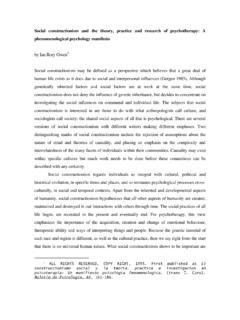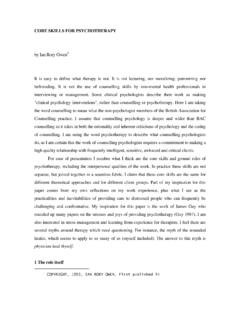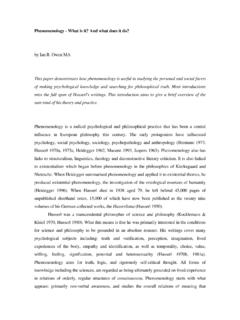Transcription of Assessment for counselling and the psychiatric services
1 Assessment for counselling and the psychiatric services by Ian Rory Owen 1. This article is written with the belief that counselling is better informed if it knows about psychiatry. psychiatric emergencies occur and if they are handled well, the experience can be positive for clients and counsellors alike. But most of the general population do not understand the complex and contentious issues surrounding psychiatry. The current state of understanding indicates that psychiatric conditions are due to inherited predispositions, which may be triggered by stressful situations or drug use. The BAC code of ethics states that it is outside the remit of counsellors to work with those who are beyond their ability to provide the care clients need. This situation is compounded by third parties asking for your help, asking you to see their partner, colleague or friend who might be acutely distressed.
2 In my experience, more senior counsellors may see people who have a psychiatric disorder, but most in the profession disagree with the imposition of psychiatric treatment, the improper use of diagnostic terms, misdiagnosis and mistreatment. This paper contains the starting point that if counselling is about forming an alliance with clients in the direction of their positive mental health, then there is a case for sharing this responsibility, when they are acutely distressed. If counsellors are reluctant to notify the GP or emergency psychiatric services for those who can no longer cope, and they have no knowledge of psychiatric diagnostics, then clients are let down. The ethics of diagnosis Working with neurotic clients is a high level of responsibility and can be challenging and stressful. Problems can arise for a number of reasons when counsellors come into contact with people whose level of disturbance is high.
3 psychiatric emergencies can arise after a person 1. COPYRIGHT, 1993, IAN RORY OWEN. First published in 1. comes through a deep depression and regains sufficient energy to act on suicidal thoughts. They also occur when someone is troubled by auditory, visual or kinaesthetic hallucinations. If someone has lost their ability to look after themselves, then it behooves counsellors to make appropriate referrals. They may act on them to harm themselves or others. Counsellors may be faced with attempted suicide, persons at risk of suicide, and those who are currently psychotic. Given that a great deal of distress results for counsellors whose clients commit suicide after or during contact with them, it is easiest to proceed when they know where they stand on the boundaries of the relationship they provide. The BAC Code of Ethics, , states that counsellors ..hold different views about whether or not a client expressing serious suicidal intentions forms sufficient grounds for breaking confidentiality.
4 Counsellors should consider their own views and practice and communicate them to clients and any significant BAC 1990. But is it within the remit of counsellors to notify the psychiatric services , if agreed with clients beforehand, in the possibility of someone being psychotic or a suicide risk? My answer is yes. I believe that counsellors have the responsibility to recommend a psychiatric Assessment as part of their role. The full spectrum of psychiatric disorders can be split into three broad types. Here I use the term "mental illness" but it is not really suitable. Those who suffer in this way come from all races, cultures, classes and family constellations. The word illness is only partially suitable because it refers to behaviour, personality and abilities, and is not an illness at all. There are those who can make a full recovery through medication, general life changes, counselling or therapy.
5 But some people do not respond, and the changes for them are irreversible, or they deteriorate despite all the help that can be provided. The amount of people with psychotic illnesses is less than one per cent of the population, of whom ten per cent commit suicide as an escape from torment. About one per cent of all people have one of the depressive illnesses, and between ten and 15 per cent kill themselves. The third counselling , 4(4), 287-289. 2. major psychiatric category is personality disorder, and over one per cent of the population are like this. They may kill themselves on impulse, or in an attention-seeking gesture that goes wrong. Good overviews of the psychiatric terms, the role of the psychiatric social worker and psychiatric nursing are found in Fish (1985), Brown (1987) and Townsend (1991). Thomas Szasz has done much to point out the ethical and legal dilemmas in psychiatry (Szasz 1972).
6 Contrary to him I think there is a good argument for "sectioning": placing people under sections of the Mental Health Act 1983. If a person wishes to receive psychiatric care voluntarily, then there is no need to detain him or her by a section, a legal-medical warrant. Szasz believes that sectioning in psychiatric care is wrong because it is against what he sees an ethical imperative for people to be self responsible and free: But, psychiatry is bound to carry out the law. Szasz's argument implies a request to accept those in acute distress, and asks that they be left alone if they do not ask for help. The other side of this argument acknowledges the needs to provide treatment and social control. I am critical of those who are ignorant of the Mental Health Act 1983 and its sections which have much significance to counselling and psychotherapy. Under the Act those who are a risk to themselves or others may be taken to a safe place, so the public is protected from possible attack.
7 The argument for sectioning aims to reduce suffering on humanitarian grounds, even against someone's will. Section Brief description 2 Admission for Assessment up to 28 days. 3 Admission for treatment up to 6 months. 4 Admission for emergency treatment up to 72 hours. 115 Gives an ASW the power to enter and inspect any premises in which a mentally disordered person is living. 136 Gives a police constable the power to remove to a place of safety a person whom he finds in a place to which the public 3. have access, and who appears to him to be suffering from mental disorder and be in immediate need of care. Fig 1 - Some sections of the Mental Health Act 1983. For myself, if I or a member of my family became mentally ill, then I would want them to have treatment by those who are experienced in it at the earliest opportunity. It can be part of the nature of mental illness that people are not capable of making informed decisions.
8 The sections mentioned above allow those in suffering to be held in a hospital and even medicated against their will. The roles of Approved Social Worker (ASW) and psychiatric staff are to balance the rights of the distressed individual with those of the community at large. As there is no strict dividing line between neurosis and psychosis this is a difficult decision to make. When people are held in a psychiatric hospital it requires the permission of the ASW, general practitioner and psychiatrist to make the application for a section. The ASW must try to contact and inform the nearest relative about the procedure and implications of the section, and they may also give their permission for the section to be carried out. On arriving at the hospital the staff inform clients of their rights. It is possible to appeal against the section, and another psychiatrist would be called in to give a second opinion.
9 On counselling Assessment Assessment is part of counselling as it formalises the process of selecting who you are going to work with, and whether they are within one's current boundary of competence. Assessment for counselling could be carried out as part of the first six sessions perhaps, and may involve taking a formal history of any previous contacts with the mental health services , any current medication, and record clients' addresses and GP details. The dilemma in Assessment is whether to ask direct questions to get the details you need, or whether to let clients unfold their history in their own way. The first step is determining if a client's level of distress is sufficiently high to require an emergency intervention. The second step is knowing how to refer a client in acute distress to the emergency services . Therefore, it is necessary to have a working knowledge of psychiatric diagnostics.
10 An Assessment could: 4. 1. Partly be "needs led" and totally from clients' perspectives. 2. Also allow counsellors to identify areas of unmet need and issues clients may need to focus on. 3. Provide clients with choice, flexibility and information so that they can make an informed commitment to counselling . 4. Be orientated around the principles of monitoring the quality of care being provided, and "helping, not harming". 5. Assessment will also include setting the boundaries of the counselling relationship, Assessment of the type of intervention required, and psychiatric Assessment . 6. Assessment will be on-going, as counsellors monitor their own performance, alone and through supervision, monitor clients' progress, and review the ground covered, while being open about their own limitations. 7. Do you have a strong emotional reaction to meeting them? Do you like them?







